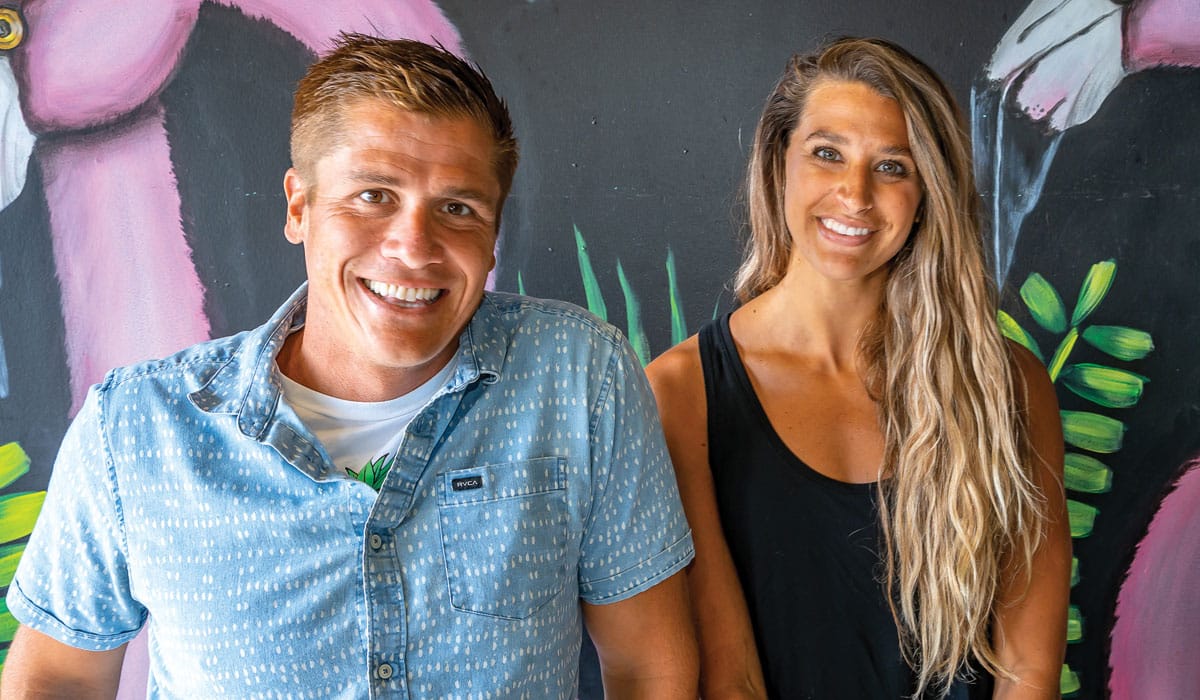Last year was an unlikely time for any restaurant to celebrate major growth accomplishments. But in November, Playa Bowls did just that when it crossed into triple-digit unit count with a store opening in Darien, Connecticut.
This occasion was an indicator of the explosive growth that the New Jersey–based açai franchise has had since cofounders Rob Giuliani and Abby Taylor opened the first brick-and-mortar location in 2015.
And it almost didn’t happen.
While growing through franchising seemed like a logical step for the pair after opening seven locations by the end of 2016, someone had to convince them to go that route.
“We had a partner in 2016 who was an MBA at Rutgers, and he pushed Abby and I pretty hard on franchising. Back in the day, we were completely against franchising,” CEO Giuliani says. “We thought it was a sellout, beyond belief that people were going to ruin our brand.”
After doing some research, the Playa Bowls team saw how important it was to look outside their company for help in growing the business, whether it be through private equity or a franchise program. They chose the latter. They then recruited Gary Moss to become the vice president of business development and operations to help with franchise-driven growth.
Playa Bowls started franchising in 2017 and nearly quadrupled its number of stores by the end of that year. By December of 2018, it had 54 stores, and then finished 2019 with 76.
From the beginning, Playa Bowls grew its franchise program slowly but surely. Giuliani estimates the first 10–15 stores were franchised to friends and family that he and Taylor knew personally. The brand then franchised to acquaintances and reputable people in their area as they continuously expanded their reach.
“We weren’t looking for the first person with enough money to open one up. It was always about truly understanding the brand, the vibe, the culture, their business plan, and how they intended to run our business and become an extension of Rob and Abby’s original vision,” Moss says.
This approach, though requiring a certain amount of due diligence, created a franchisee group with a diverse array of experiences. From retired Wall Street executives to surfers with seed money from their parents, Playa Bowls’ franchisees aren’t bound to a set track record in order to become a part of the brand. Besides having the appropriate startup capital and willingness to succeed, the team is open to partnerships with anyone who lives Playa Bowls’ image of an outdoorsy, healthy lifestyle.
Moss says the company also takes an alternative approach to the franchisor-franchisee relationship. Rather than demand a certain number of stores within a defined time period, Playa Bowls walks through the store-opening process with its franchisees in a step-by-step partnership.
“We wanted to make sure that the franchisee got a return on their investment, got a return on their time—provided that outstanding customer service was easy for our team to work with, and our team was easy for them to work with,” Moss says. “And as we checked off all of those boxes, we were able to open up more stores together.”
To Playa Bowls’ advantage, the brand had support structures in place when the pandemic first affected restaurants. It had already started partnering with third-party platforms, and could take advantage of in-app advertising and promotions.
But the açai brand didn’t have an immediate answer to how it should support its franchisees during such a tumultuous time. When new regulations and guidelines started rolling out daily, Giuliani says, the team had to constantly pivot.
Even when the team didn’t have answers, he says, relaying what they knew was a priority. “We communicated with our franchisees as much as we possibly could. We had to communicate, communicate, communicate,” Giuliani says.
When the dust settled and the Playa Bowls team saw where its franchisees stood, the brand took an individualized approach to supporting them. For some, support looked like a waiver of fees for a month or two. For others, it was speaking with landlords and leveraging the power of its many leases. Playa Bowls also sent its franchisees baseline assistance in the form of royalty deferment—an offer that some didn’t even take.
For Moss, the success of the franchisees and franchise program through COVID-19 starts with a great team and a willingness to change.
“You can’t bury your head in the sand here and run away. You have to face these challenges head-on because they’re real and they’re here,” he says.
Looking forward, Moss says the brand is aiming to grow primarily through its franchisees. After ending 2020 with 102 locations, Playa Bowls came into 2021 with 20 additional franchise agreements already signed.
That’s not to say Playa Bowls’ growth is just tied to its franchisees. With big opportunities in real estate on the horizon, Moss says, the team is not going to pass on a great space if they can’t find a franchisee. And when the right person does come along, the brand could always sell the location to a franchisee.
Finding the right franchisee is a meticulous process for a brand that hasn’t had any store closures, even during the worst of the pandemic. Giuliani says that while Playa Bowls will continue to grow through its strong franchise program, the ideal franchisee is yet to be determined.
“Who’s our perfect franchisee?” Giuliani says. “We don’t quite yet know, but we’ve got a pretty good gut feeling, and that’s what we’re working with right now.”







